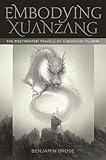Embodying Xuanzang : The Postmortem Travels of a Buddhist Pilgrim / Benjamin Brose.
Material type: TextPublisher: Honolulu : University of Hawaii Press, [2023]Copyright date: ©2023Description: 1 online resource (236 p.) : 32 illustrations, 11 in colorContent type:
TextPublisher: Honolulu : University of Hawaii Press, [2023]Copyright date: ©2023Description: 1 online resource (236 p.) : 32 illustrations, 11 in colorContent type: - 9780824896379
- 294.3/92092 23//eng/20230503eng
- online - DeGruyter
| Item type | Current library | Call number | URL | Status | Notes | Barcode | |
|---|---|---|---|---|---|---|---|
 eBook
eBook
|
Biblioteca "Angelicum" Pont. Univ. S.Tommaso d'Aquino Nuvola online | online - DeGruyter (Browse shelf(Opens below)) | Online access | Not for loan (Accesso limitato) | Accesso per gli utenti autorizzati / Access for authorized users | (dgr)9780824896379 |
Frontmatter -- Contents -- Acknowledgments -- List of Abbreviations -- Prologue: Xuanzang’s Reincarnations -- 1 Fiction -- 2 Apotheosis -- 3 Guardian -- 4 Psychopomp -- 5 Savior -- Epilogue: Perpetual Pilgrimage -- Appendix -- Notes -- Bibliography -- Index -- About the Author
restricted access online access with authorization star
http://purl.org/coar/access_right/c_16ec
Xuanzang (600/602–664) was one of the most accomplished and consequential monks in the history of East Asian Buddhism. Celebrated for his sixteen-year pilgrimage from China to India, his transmission and translation of hundreds of Buddhist texts, and his training of a generation of masters in China, Korea, and Japan, Xuanzang’s life and legacy are the stuff of legend. In the centuries after his death, stories of his epic adventures and extraordinary accomplishments circulated in texts, images, songs, and plays. These mythic accounts recast the erudite pilgrim, translator, and court cleric as a magical monk who traveled not between China and India but between heaven and earth. Beset by bloodthirsty demons, this deified version of Xuanzang navigates the perilous paths of the netherworld to reach a pure land in the west. His purpose is to acquire a cache of sacred scriptures with the power to safeguard the living and deliver the dead. Along the way, he is guided and protected by a mischievous monkey, a lazy pig, a demonic monk, and a dragon horse. This imaginative and compelling tale received its fullest and most influential treatment in the famous sixteenth-century novel Journey to the West.In this engaging exploration of the confluence of myth, narrative, and ritual, Benjamin Brose uncovers the hidden histories of Xuanzang’s many afterlives. Beginning in the eleventh century and continuing to the present day, devotees have summoned Xuanzang and his band of misfit pilgrims to perform exorcisms, guide the spirits of the dead, and possess the bodies of insurgents. Embodying Xuanzang traces the postmortem travels of China’s greatest pilgrim and reveals the narrative and performative roots of China’s best-known novel.
Mode of access: Internet via World Wide Web.
In English.
Description based on online resource; title from PDF title page (publisher's Web site, viewed 06. Mrz 2024)


